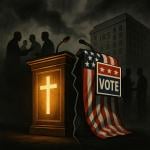THE QUESTION:
What does biblical religion teach about forgiving loan debts?
THE RELIGION GUY’S ANSWER:
President Biden’s pre-election executive order to limit or erase college students’ loan debts is back in the news this week. The non-partisan Congressional Budget Office issued its “highly uncertain” estimate that the plan will cost at least $420 billion, the first federal lawsuits filed against it argued that only Congress can legally enact spending, and the Department of Education scaled back the numbers who get this benefit.
The President claims the power to bypass Congress under the “HEROES Act,” passed after the 9/11/01 attacks, which allows forgiveness in case of a “military operation or national emergency.” Biden interprets the COVID pandemic as such an emergency; critics call that a stretch.
Biden says that now “people can start to finally crawl out from under that mountain of debt to get on top of their rent and their utilities, to finally think about buying a home or starting a family or starting a business.” But a Wednesday Wall Street Journal editorial considered cancellations “unfair to Americans who repaid their loans or didn’t go to college” and accused Biden of “the biggest executive usurpation of Congress in modern history.”
As all this plays out, does the Bible, which has so long shaped moral judgments on public policy, have anything to say on such matters?? Liberal Protestant blogger John Pavlovitz chided Christians who oppose Biden, saying they ignore that “their entire professed religion is based on the idea of a cancelled debt. Way to lose the plot, kids.” Podcaster Allie Beth Stuckey responded for World magazine that “the debt is sin, and Jesus, God made flesh, voluntarily paid it on our behalf through his death on a cross” so that “we are reconciled to God forever.”
One wording of history’s most-recited prayer asks God to “forgive us our debts as we forgive our debtors.” In Sojourners magazine,” which advocates “racial and social justice” on “biblical” grounds, Braxton Brewington of the Debt Collective writes that the Lord’s Prayer teaches “debt abolition” so the U.S. should go far beyond Biden’s plan, wiping out the entirety of student debt and all credit card balances due for “medical care, rent, and other basic needs.”
The conventional Christian interpretation is that the Lord’s Prayer is about each individual’s spiritual and moral failings, and not financial affairs, though this may involve societal as well as personal sin. Also consider Jesus’ well-known parable of the unforgiving servant in Matthew 18:21-35.
For sure, the Old and New Testaments are filled with admonitions to help those caught in economic distress. And remarkably, Scripture prescribed thoroughgoing debt forgiveness during the “Sabbatical Year” as depicted in Deuteronomy 15:1-2 (JPS translation): “Every seventh year you shall practice remission of debts. This shall be the nature of the remission: every creditor shall remit the due that he claims from his fellow; he shall not dun his fellow or kinsman, for the remission proclaimed is of the LORD. . . “
Why? So that “there shall be no needy among you” in the promised land. Note that debt forgiveness did not apply to non-Israelites, and the nation is told not to become a debtor, which is how the Book of Proverbs advised individuals. There were limitations on remission, and when the system became unworkable, influential 1st Century B.C.E. Rabbi Hillel the Elder devised a work-around as courts largely took over management of debts, whereas a literal reading applied Deuteronomy only to individual creditors.
Why seven years? That is a sacred number seen in the seven days of creation and Scripture’s unique seven-day week that ends with a Sabbath free from cares over making a living. Also, the biblical Jubilee of seven times seven years returned ancestral lands and freed indentured debt-slaves (see Leviticus 25), though it’s unclear historically whether this was a wide observance or only an ideal.
In a pre-Biden article, religious Denver bankruptcy attorney Rob Cohen said Deuteronomy’s ancient seven-year rhythm of forgiveness is mirrored in U.S. law, where individuals can file for bankruptcy protection and seek legal discharge of debts every eight years. Cohen thinks both the Bible and modern bankruptcy law intend that “no one should go their entire lives saddled with unmanageable debts. It’s O.K. to ask for help once you’ve run out of options. . . . Bankruptcy should be a last resort for those in severe financial distress, but when it is needed it is not unethical in the eyes of the Bible.”
Concern for those in financial distress also animated Exodus 22:24 (or 25): “If you lend money to My people, to the poor among you, do not act toward them as a creditor; exact no interest from them.” See also Leviticus 25:35-37. Christianity generally banned all charging of interest till business-minded Protestants, and eventually Catholics, reverted to the Bible’s original focus on interest paid by “the poor” and, by extension, unjust over-charging of anyone. (Islam forbids all charging of interest to this day.)
David French, a key evangelical religious-liberty attorney turned journalist with thedispatch.com (who left Harvard Law with $80,000 in debt), writes that a Christian case can be made for Biden’s idea but there’s also a good case against. The Bible emphasizes help in situations of “profound” economic oppression, as with bankruptcy relief, he says. Thus he objects that the Biden order “benefits America’s wealthiest and most powerful citizens” as 320 million people pay to benefit 30 million collegians.
He cites such a complaint from Harvard economist Jason Furman, who chaired President Obama’s Council of Economic Advisors. French is favorable toward forgiveness plan targeted to help needy students that will include the legally necessary action by Congress. His proposal in full is at https://frenchpress.thedispatch.com/p/is-there-a-christian-case-for-bidens/












